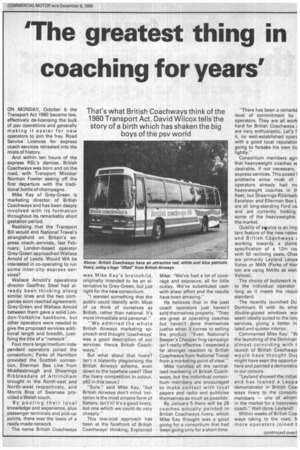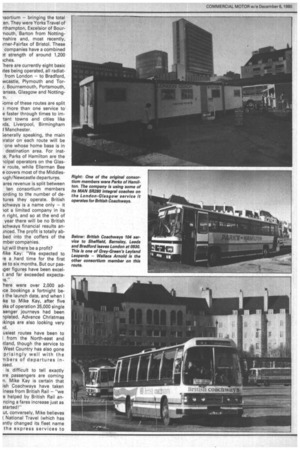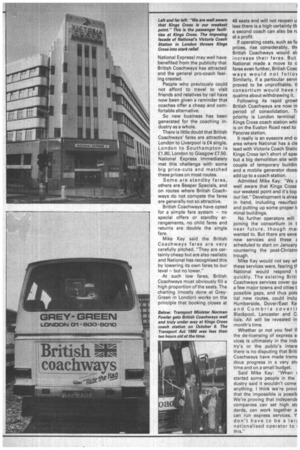'The greatest thing in coaching for years'
Page 59

Page 60

Page 61

If you've noticed an error in this article please click here to report it so we can fix it.
That's what British Coachways think of the 1980 Transport Act. David Wilcox tells the story of a birth which has shaken the big boys of the psv world
ON MONDAY, October 6 the Transport Act 1980 became law, effectively de-licensing the bulk of psv operations and generally making it easier for new operators to join the fray. Road Service Licences for express coach services retreated into the mists of history.
And within ten hours of the express RSL's demise, British Coachways was born and on the road, with Transport Minister Norman Fowler seeing off the first departure with the traditional bottle of champagne.
Mike Kay of Grey-Green is marketing director of British Coachways and has been deeply involved with its formation throughout its remarkably short gestation period.
Realising that the Transport Bill would end National Travel's stranglehold on Britain's express coach.. services, last February, London-based operator Grey-Green approached Wallace Arnold of Leeds. Would WA be interested in co-operating to run some inter-city express services?
Wallace Arnold's operations director Geoffrey Steel had already been thinking along similar lines and the two companies soon reached agreement. Grey-Green and Wallace Arnold between them gave a solid London-Yorkshire backbone, but other operators were needed to give the proposed services additional length and breadth, justifying the title of a "network".
Four more large/medium independent operators joined the consortium; Parks of Hamilton provided the Scottish connection, Ellerman Bee Line from Middlesbrough and Shearings Ribblesdale of Altrincham brought in the North-east and North-west respectively, and Morris Bros of Swansea provided a Welsh touch.
By pooling their local knowledge and experience, plus passenger terminals and pick-up points, there was the basis of a ready-made network.
The name British Coachways
was Mike Kay's brainchild, originally intended to be an alternative to Grey-Green, but just right for the new consortium.
"I wanted something that the public could identify with. Most of us think of ourselves as British, rather than national. It's more immediate and personal."
"We admired the whole British Airways marketing approach and thought 'coachways' was a good description of our services. Hence British Coachways."
But what about that livery? Isn't it blatantly plagiarising the British Airways scheme, even down to the typeface used? (See the livery competition in colour, p62 in this issue.) "Sure," said Mike Kay, "but British Airways don't mind. Imitation is the most sincere form of flattery, isn't it? It's a good livery, but one which we could do very cheaply."
This low-cost approach has been at the forefront of British Coachways' thinking. Explained Mike: "We've had a lot of coverage and exposure, all for little outlay. We've substituted cash with sheer effort and the results have been amazing."
He believes that in the past coach operators just haven't sold themselves properly. "They are great at operating coaches but haven't done themselves justice when it comes to selling the product. "Even National's Beeper's Cheaper frog campaign isn't really effective. I expected a far stronger reaction to British Coachways from National Travel from a marketing point of view."
Mike handles all the centralised marketing of British Coachways, but the individual consortium members are encouraged to make contact with local papers and radio and publicise themselves as much as possible.
By January 5 there will be 28 coaches actually painted in British Coachways livery, which Mike Kay thought was a good going for a consortium that had been going only for a short time. "There has been a remarka level of commitment by operators. They are all work hard for British Coachways are very enthusiastic. Let's f it, no well-established operE with a good local reputatior going to forsake his own liv lightly."
Consortium members agn that heavyweight coaches w desirable, if not necessary, express services. This posed f problems since most of operators already had rriz. heavyweight coaches in tifleet; but Shearings Ribblesth Excelsior and Ellerman Bee L are all long-standing Ford us and are currently looking some of the heavyweights the market.
Quality of swvice is an imp tant feature of the new netwc and British Coachways working towards a stand; specification of a 12m coi with 50 reclining seats. Chas are primarily Leyland Leopa Volvo or MAN (Parks of Har ton are using MANs as well Volvos).
The choice of bodywork is to the individual operator long as it meets the requii standard.
The recently launched Du Dominant III with its smal double-glazed windows woi seem ideally suited to the lonc services, giving a better in: lated and quieter interior.
Commented Mike Kay: "N./ the launching of the Dominary almost coinciding with t launch of British CoachwayE would have thought Dur might have seen the opportur here and painted a demonstra in our colours.
"Leyland showed the initiat and has loaned a Leopa demonstrator in British Coal ways livery to the consortit. members — one of whom in the market for a heavywei coach." Well done, Leyland!
Within weeks of British Coa, ways taking to the road, fc more operators joined t
lsortium — bringing the total :en. They were Yorks Travel of rthampton, Excelsior of Baur:nouth, Barton from Nottingrshire and, most recently, irner-Fairfax of Bristol. These companies have a combined 3t strength of around 1,200
-here are currently eight basic Iles being operated, all radiatfrom London — to Bradford, wcastle, Plymouth and Tor', Bournemouth, Portsmouth, :ansea, Glasgow and NottingTh ;ome of these routes are split ) more than one service to e faster through times to im-cant towns and cities like :ds, Liverpool, Birmingham i Manchester.
;enerally speaking, the main a:rator on each route will be one whose home base is in destination area. For inst;e, Parks of Hamilton are the icipal operators on the Glasrv route, while Ellerman Bee e covers most of the Middlesugh/Newcastle departures. ares revenue is split between ten consortium members ording to the number of delures they operate. British 3chways is a name only — it lot a limited company in its n right, and so at the end of year there will be no British 3chways financial results aninced. The profit is totally abbed into the coffers of the mber companies.
Iut will there be a profit?
/like Kay: "We expected to re a hard time for the first to six months. But our pasiger figures have been excelt and far exceeded expectais."
here were over 2,000 adice bookings a fortnight be?. the launch date, and when I ike to Mike Kay, after five ?.ks of operation 35,000 single senger journeys had been ipleted. Advance Christmas ■ kings are also looking very )d.
usiest routes have been to I from the North-east and rtland, though the service to West Country has also gone :prisingly well with the -nbers of departures in)sed.
is difficult to tell exactly ?,re passengers are coming n. Mike Kay is certain that ish Coachways have taken mess from British Rail — "we e helped by British Rail anncing a fares increase just as started!"
ut, conversely, Mike believes t National Travel (which has antly changed its fleet name the express services to National Express) may well have benefited from the publicity that British Coachways has attracted and the general pro-coach feeling created.
People who previously could not afford to travel to visit friends and relatives by rail have now been given a reminder that coaches offer a cheap and comfortable alternative.
So new business has been generated for the coaching industry as a whole.
There is little doubt that British Coachways' fares are attractive. London to Liverpool is £4 single, London to Southampton is £1.90, London to Glasgow 0.50. National Express immediately met this challenge with some big price-cuts and matched these prices on most routes.
Some are standby fares, others are Beeper Specials, and on routes where British Coachways do not compete the fares are generally not so attractive.
British Coachways have opted for a simple fare system no special offers or standby arrangements, no child fares and returns are double the single fare.
Mike Kay said the British Coachways fares are very carefully pitched. "They are certainly cheap but are also realistic and National has recognised this by lowering its own fares to our level but no lower."
At such low fares, British Coachways must obviously fill a high proportion of the seats. The charting (mostly done at GreyGreen in London) works on the principle that booking closes at 48 seats and will not reopen u less there is a high certainty th a second coach can also be at a profit.
If operating costs, such as fu prices, rise considerably, thE British Coachways would all increase their fares, But National made a move to c fares even further, British Coac ways would not folios, Similarly, if a particular servi, proved to be unprofitable, ti consortium would have r qualms about withdrawing it.
Following its rapid growl British Coachways are now in period of consolidation. Tc priority is London terminal Kings Cross coach station whi. is on the Euston Road next to Pancras station.
It really is an eyesore and o: area where National has a cle lead with Victoria Coach Static Kings Cross isn't short of spa( but a big demolition site with couple of temporary buildin and a mobile generator doesi add up to a coach station.
Admitted Mike Kay: "We E well aware that Kings Cross our weakest point and it's top our list." Development is alrea in hand, including resurfaci and putting up some proper ti mina' buildings.
No further operators will joining the consortium in t near future, though mai wanted to. But there are seve new services and these e scheduled to start on January countering the post-Christm trough.
Mike Kay would not say wt these services were, fearing tt National would respond t quickly. The existing Briti Coachways services cover qu a few major towns and cities t possible gaps, and thus potE tial new routes, could inclu Humberside, Dover/East Ke and Cumbria coverir Blackpool, Lancaster and C. lisle. All will be revealed in month's time.
Whether or not you feel tl the de-licensing of express s. vices is ultimately in the indi try's or the public's intere there is no disputing that Briti Coachways have made tremr dous progress in a very shi time and on a small budget.
Said Mike Kay: "When ■ started some people in the dustry said it wouldn't come anything. I think we're provi that the impossible is possib We're proving that independE companies can set high ste dards, can work together a can run express services. Y don't have to be a lar nationalised operator to this."












































































































































